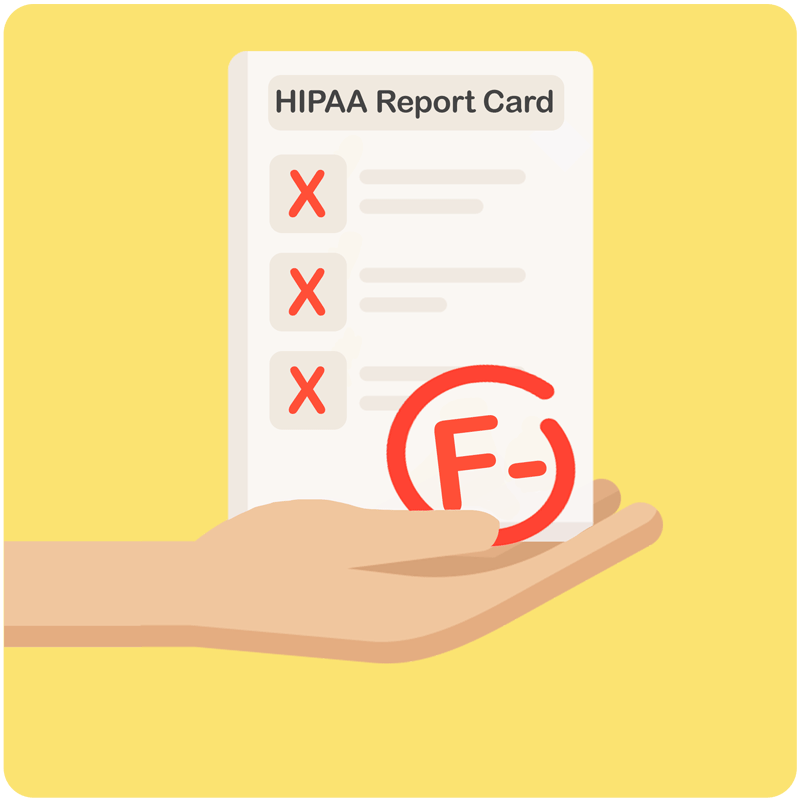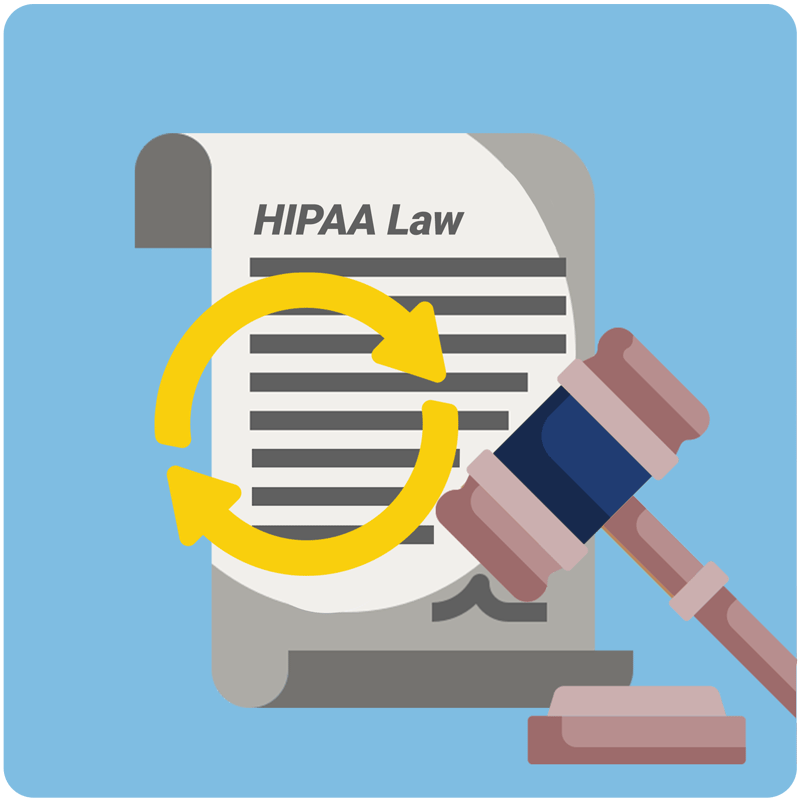December 29, 2020 Peanut butter and jelly, macaroni and cheese, rock and roll – there’s really no mistaking that some things are just better in pairs. While these might be the obvious examples to tag along with the old 80’s hit “It Takes Two to Make a Thing Go Right” there’s another dynamic duo that plays an important role in your practices’ daily operations: Compliance and Security. Compliance and security go hand-in-hand, making the perfect team when it comes to protecting patient data. But falling into the trap of thinking that achieving one means meeting the other can mean double trouble for your practice – so it’s important to understand the differences between the two and how to ensure you’re checking both off your list. What is compliance? Compliance is kind of like the bread and butter of your practice. It essentially focuses on the regulatory requirements involved in the protection of sensitive patient data – meaning that you not only have a secure technical environment but also have the know-how and documentation to prove it. Compliance is a comprehensive set of standards that practices must meet to avoid fines but should be viewed as more of a baseline when it comes to security, not the end all be all. Complying with HIPAA means meeting various requirements outlined in the HIPAA Security and Privacy Rule – but there’s more to the story when it comes to ensuring that patient data is fully protected. What is security? Security is the whole system of policies, processes, and technical controls specific to your practice. The goal of security is to ensure the best possible protection of the confidentiality, integrity, and availability of patient data – which in the age of technology means constantly updating to mitigate the risk of ever-changing threats. When we think of security we often think of locks on practice doors and passwords on computers but those safeguards only brush the surface of true security. Having the proper technical safeguards in place, and staying up to date on any new threats, such as the recent threat to Microsoft Exchange vulnerabilities knowing how to properly mitigate a potential threat, and staying educated are just some ways to meet your practice’s security needs. So, what’s the difference? While both are crucial in protecting patient data, security and compliance are not one and the same. The key distinction between the two is that compliance requirements are a bit more predictable whereas security standards are rapidly evolving with current risks and threats. This, unfortunately, means that even if you check off each of the compliance requirement boxes doesn’t exactly mean that your practice is 100% secure – which is why you are still at risk for a cyberattack even if you have a complete HIPAA compliance program in place. Why you need both! Just like Batman and Robin, when you put the two forces together – they’re pretty unstoppable. And with cyberattackers playing the role of the modern-day villain, establishing strong compliance AND security programs are the best, and perhaps the only way to ensure you’re taking every measure to protect patient data.
OCR Announces 13th Right of Access Fine, Drives Home Importance of Record Requests
December 22, 2020 The Office for Civil Rights (OCR) has been in the giving spirit the past few months, and they couldn’t close out 2020 without handing out at least one last holiday gift. We know there’s only 12 days of Christmas as the song goes – and we don’t think the OCR will be handing out lords-a-leaping or piper’s piping anytime soon – but there IS one more gift not mentioned in the classic song (at least the OCR 2020 edition): 13 patient right of access fines. The latest settlement adds to quite a historic year for HIPAA enforcement – and proves just how unprepared many practices have been when it comes to HIPAA compliance. This week’s extra gift went to Peter Wrobel, M.D whose practice Elite Primary Care out of Georgia found themselves doing a little extra holiday spending this year after settling with the OCR for $36,000. The settlement resolved a patient right of access complaint from April 2019, which took over a year to fully wrap (present-related pun intended). Here’s the highlights from this latest fine: Important notes for any covered entity? Make sure to provide records in a timely manner, AND in the way the patient requests them. Additionally, requests can be submitted in any form (verbal, written or otherwise) but documented, written requests are always key to best protecting your practice and meeting timeframe requirements. Take a minute to brush up on how to handle access requests if your practice needs a refresher. Taking over a year to get records access is already a bad call, but proposed changes to the HIPAA Privacy Rule will make the typical 30 day timeframe to provide records even shorter. When it comes to patients getting access to their own PHI, the OCR is serious about keeping covered entities of all sizes in line. While this may not have been the gift Elite Primary Care was wishing for this year, it did come with is some wise words of advice from OCR Director, Roger Severino: “OCR created the Right of Access Initiative to address the many instances where patients have not been given timely access to their medical records. Health care providers, large and small, must ensure that individuals get timely access to their health records, and for a reasonable cost-based fee.” We hope your practice gets a better gift this year than a hefty fine – but if you aren’t certain where you stand, get the gift of confidence in your HIPAA program by scheduling an educational webinar today!
Latest HIPAA Audit Industry Report
December 18, 2020 End of year report cards are in (or at least they are for covered entities) and the HIPAA compliance grades the Office for Civil Rights (OCR) & Department of Health and Human Services (HHS) just handed out are not ones to write home about. Just yesterday, the HHS released their latest HIPAA Audits Industry Report grading providers and business associates’ on their level of compliance with HIPAA regulations. The report evaluated audit results from 166 covered entities and 41 business associates, focusing specifically on compliance with the Notice of Privacy Practices, patient records access, breach notifications timeliness and content, the Security Risk Analysis, and appropriate risk management programs. While the full report is pretty lengthy, we’ve compiled some of the top takeaways from these latest results: So what does this data tell us? In some ways, nothing new – all of the areas audited have factored heavily into recent OCR enforcement activity, and highlight the same trends we’ve seen all year. If not part of recent enforcement, these areas factor into the recent proposal to modify the HIPAA Privacy Rule, including proposed adjustments to the Notice of Privacy Practices. “The audit results confirm the wisdom of OCR’s increased enforcement focus on hacking and OCR’s Right of Access initiative,” said OCR Director Roger Severino in addition to the latest report, “we will continue our HIPAA enforcement initiatives until health care entities get serious about identifying security risks to health information in their custody and fulfilling their duty to provide patients with timely and reasonable, cost-based access to their medical records.” What NEW information can we take away from these results? Organizations are STILL. NOT. COMPLIANT. Many of the covered entities or business associates audited produced what they thought was sufficient evidence, but did not meet actual HIPAA requirements. Some weren’t even close – when asked to produce an SRA, entities provided irrelevant documents like a patient’s insurance prescription coverage and rights; a document discussing pharmacy fraud, waste and abuse; and a conflict of interest and code of conduct employee sign-off page – none of which are even semi-related to an actual SRA. If your practice wants to get a slightly better HIPAA grade than the ones in this recent audit, ensuring you have the PROPER documentation in place, and meet ALL HIPAA requirements is key. If HIPAA isn’t your best subject, a software solution like Abyde is the tutor you’ve been needing to help walk you through the process to get an A+ (plus avoid hefty HIPAA fines, stress over your HIPAA program, and general unhappiness).
HHS Proposes Changes to HIPAA Privacy Rule
December 11, 2020 When you thought of HIPAA, was the image that came to mind an old, never-changing and outdated law? If it was, the Department of Health & Human Services (HHS) just issued a wake-up call with a new Notice of Proposed Rulemaking (NPRM), announced yesterday, to make fresh new modifications to the HIPAA Privacy Rule. So what may be changing when it comes to HIPAA? The proposed modifications are designed to address barriers to value-based health care, particularly those that limit or discourage care coordination and case management communications, as well as amend provisions of the Privacy Rule that pose “unnecessary regulatory burdens” without sufficiently improving privacy protections. While the 357 page document contains a lot of information, a few highlights of the proposed changes include: There’s a lot to unpack within these proposed changes, but in general, the proposal helps to bring the HIPAA Privacy Rule up to date with current technology usage, in addition to expanding and emphasizing patient’s rights to view, receive, and handle their own PHI. While these rules are just a proposal, it’s highly likely that most of these changes will go into effect (or a similar version of them) once the proposal’s comment period ends. So when will you need to worry about these changes? Since the proposal’s announcement on December 10th, comments on the notice are due within 60 days. Once the comment period has ended and any changes are finalized, the effective date will be 60 days from the final publication. Your practice will still have a little breathing room, as covered entities would have 180 days from the effective date to update or implement policies to achieve compliance with these new or modified standards – essentially, you’ll have 240 days after the rule is finalized to comply. While complying with these proposed Privacy Rule changes won’t be necessary for quite a while, knowing what is coming and preparing your practice ahead of time is still key. If you don’t have a current compliance program in place that reflects the most recent industry threats and updates, consider throwing out what may be a very old HIPAA binder and seeking out a new solution that can help you dynamically update your policies as these changes go into effect next year.
Meeting December HIPAA Requirements: What Your HIPAA Program is Probably Missing
December 3, 2020 Who doesn’t love the whole “new year, new you” excitement but before you press fast forward on the month of December there’s a few key pieces of HIPAA you are probably missing – but can still catch up on before December 31 HIPAA deadlines hit. You may be thinking “I did my Security Risk Analysis, I’m good!” or even “we did training that one time, we’re fine!”. Don’t shoot the messenger, but there’s a LOT of other pieces that go into your HIPAA program besides annual HIPAA training and the Security Risk Analysis. Before you panic, you aren’t alone – on the latest round of OCR audits, they found that only 17% of practices had performed a Security Risk Analysis, and only 6% had a security risk management program (the documentation, policies, and additional HIPAA pieces required) in place. What do I need by December 31? So what do you actually need in place, and how do you get this new checklist completed before the end of the month? First, let’s cover what you need to have at a minimum: 1. Your Security Risk Analysis (SRA) We call this the first step in HIPAA compliance for a reason. The SRA sets the baseline for your practice by assessing all physical, technical, and administrative areas of risk and determining where your HIPAA program stands. Your SRA must be updated annually, and should be more than a generic checklist – it should cover all the aspects of your practice most at risk, and should provide you with actionable insights to your high, medium and low risk areas. 2. Annual HIPAA Training If your practice has the first requirement down, you may also have HIPAA training somewhere on your radar. Some practices either do training once, instead of annually as required, or fail to document training correctly. You should have a certificate or other record of completion for each staff member, dated within 2020, to meet this requirement. The easiest way to do HIPAA training? Using an automated system lets staff take training individually, without having to shut down your practice or hire an outside trainer for a day. 3. Documented Policies & Procedures This is where practices might start to miss the mark. You may have a few policies, or an older HIPAA manual perhaps, but documentation to the government standards is key to meeting this requirement. That means having updated, current and specific documentation that accurately reflects your practice operations today (instead of an outdated manual from 6 years ago) and touches on all HIPAA requirements – not just one or two areas. 4. Updated HIPAA Logs If you have all of the above (major kudos if you do), having the right logs of all HIPAA related access, assets and possible breaches is still a commonly missed area, and is key to documenting how your practice handled HIPAA incidents in the past year. All of these pieces should be completed on an annual basis, and tie into the many other requirements that go into a complete HIPAA program. How do I do it by the end of the year? If any of the above sound scary or completely left-field to you – don’t panic! Taking one piece at a time, starting with your SRA, will help you chip away at these requirements. Odds are you probably have a piece or two, but may be missing additional aspects of your HIPAA program. There’s a few ways you can tackle these requirements, including: No matter what you do, leaving HIPAA to the last minute may leave you in a bit of a time crunch, and failing to complete these requirements will leave your practice open to hefty fines. Thankfully, there is an easy solution that will check everything off your list with plenty of time left to enjoy the holidays instead of stressing about HIPAA! Schedule a quick consultation with a HIPAA expert and see where you might be missing the mark, and how Abyde could help you breeze through these requirements before December 31.




